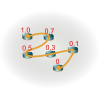p2p4wsn – Efficient Data Management in Mobile Sensor Networks using Peer-to-Peer Technologies

Projektbeschreibung
The primary research goals are the integration of mechanisms and methodologies learnt from peer-to-peer research in the field of sensor networks. It appears obvious that several technologies developed for peer-to-peer systems can be directly applied to the open issues in multi-hop ad hoc sensor networks because the primary structure of both network types is identical. Peer-to-peer networks try to build an overlay structure on existing networks. Using this overlay network, new communication paradigms can be applied and special hardware and software required for interconnecting single nodes in the physical structure are hidden from the applications point of view. The primary goals of peer-to-peer systems were the allocation and distributed utilization of available resources such as processing power and data storage.
The figure shows the principles of the intended construction. The physical sensor network is mapped to an overlay network as described in the peer-to-peer research area. At this level, task selection, data location lookup, and data forwarding is optimized. Finally, the single operations such as store and forward are mapped to lower level functionality.
In the proposed research plan, the primary focus is on task allocation, data storage, data aggregation, and data transport in multi-hop ad hoc networks.
The lessons learnt in peer-to-peer research should be applied to the field of sensor networks and embedded systems. Besides the described similarities between both research areas, the main difference is the problem of low power resources in typical sensor networks. Therefore, the algorithms must be analyzed and possibly reconstructed with the power consumption in mind.
The final objective is to develop methodologies for task allocation and data management which are very efficient in terms of speed, adaptability, and power consumption.
Projektdauer
- 2006-04-01 – 2009-12-31
Projektmitglieder
- Dr.-Ing. Abdalkarim Awad
- PD Dr.-Ing. habil. Falko Dressler
Förderer
Verwandte Publikationen
- , „Enabling Inter-Domain Routing in Virtual Coordinate Based Ad Hoc and Sensor Networks,“ Proc. of 15th ACM Annual Intern. Conf. on Mobile Computing and Networking, Beijing, China, September 2009
- , „Efficient Service Discovery in Sensor Networks using VCP“, Proceedings of 15th ACM Annual Intern. Conf. on Mobile Computing and Networking, Beijing, China, September 2009
- , „Efficient Routing and Service Discovery in Sensor Networks using Virtual Cord Routing,“ Proc. of 7th ACM Intern. Conf. on Mobile Systems, Applications, and Services, Kraków, Poland, Juni 2009
- , „Advantages of Virtual Addressing for Efficient and Failure Tolerant Routing in Sensor Networks,“ Proc. of 6th IEEE/IFIP Conf. on Wireless On demand Network Systems and Services, Snowbird, UT, USA, pp. 111-118, Februar 2009
- , „Virtual Cord Protocol (VCP): A Flexible DHT-like Routing Service for Sensor Networks,“ Proc. of 5th IEEE Intern. Conf. on Mobile Ad-hoc and Sensor Systems, Atlanta, GA, USA, pp. 133-142, September 2008
- , „Distributed Data Management in Sensor Networks using miniDB / miniSQL,“ Proc. of 4th IEEE/ACM Intern. Conf. on Distributed Computing in Sensor Systems, Santorini Island, Greece, pp. 27-28, Juni 2008
- , „P2P-based Routing and Data Management using the Virtual Cord Protocol (VCP),“ Proc. of 9th ACM Intern. Symposium on Mobile Ad Hoc Networking and Computing, Hong Kong, China, pp. 443-444, 2008

- , „Sensor/Actuator Networks in Smart Homes for Supporting Elderly and Handicapped People,“ Proc. 21st IEEE Int. Conf. on Advanced Information Networking and Applications: First International Workshop on Smart Homes for Tele-Health, Niagara Falls, Ontario, Canada, pp. 863-868, Mai 2007